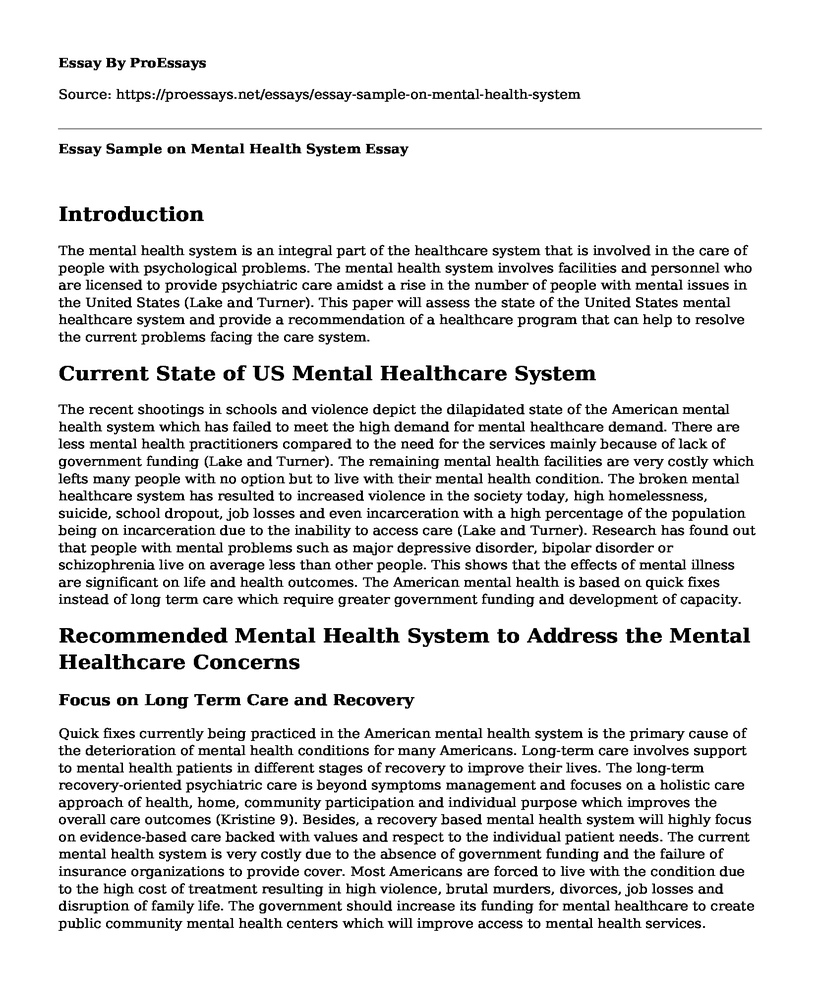Introduction
The mental health system is an integral part of the healthcare system that is involved in the care of people with psychological problems. The mental health system involves facilities and personnel who are licensed to provide psychiatric care amidst a rise in the number of people with mental issues in the United States (Lake and Turner). This paper will assess the state of the United States mental healthcare system and provide a recommendation of a healthcare program that can help to resolve the current problems facing the care system.
Current State of US Mental Healthcare System
The recent shootings in schools and violence depict the dilapidated state of the American mental health system which has failed to meet the high demand for mental healthcare demand. There are less mental health practitioners compared to the need for the services mainly because of lack of government funding (Lake and Turner). The remaining mental health facilities are very costly which lefts many people with no option but to live with their mental health condition. The broken mental healthcare system has resulted to increased violence in the society today, high homelessness, suicide, school dropout, job losses and even incarceration with a high percentage of the population being on incarceration due to the inability to access care (Lake and Turner). Research has found out that people with mental problems such as major depressive disorder, bipolar disorder or schizophrenia live on average less than other people. This shows that the effects of mental illness are significant on life and health outcomes. The American mental health is based on quick fixes instead of long term care which require greater government funding and development of capacity.
Recommended Mental Health System to Address the Mental Healthcare Concerns
Focus on Long Term Care and Recovery
Quick fixes currently being practiced in the American mental health system is the primary cause of the deterioration of mental health conditions for many Americans. Long-term care involves support to mental health patients in different stages of recovery to improve their lives. The long-term recovery-oriented psychiatric care is beyond symptoms management and focuses on a holistic care approach of health, home, community participation and individual purpose which improves the overall care outcomes (Kristine 9). Besides, a recovery based mental health system will highly focus on evidence-based care backed with values and respect to the individual patient needs. The current mental health system is very costly due to the absence of government funding and the failure of insurance organizations to provide cover. Most Americans are forced to live with the condition due to the high cost of treatment resulting in high violence, brutal murders, divorces, job losses and disruption of family life. The government should increase its funding for mental healthcare to create public community mental health centers which will improve access to mental health services.
The recovery-based mental health system will focus on the integration of the mental health system to general public healthcare especially and the community level which will increase the overall access to care and support services. An integrated system allows the provision of mental care support services at different recovery stages (Kristine 9). Besides, the integration of care will enable the provision of culturally competent care that reflects the cultural needs of the community. Therefore, the federal and the states governments should have a significant role of capacity building in the new mental health system to cushion the high cost and also increase capacity by funding mental health education to produce more competent practitioners.
Principles of Community Psychology Present in the New System
Ecological Perspective
In this community psychology perspective, the new mental health system focuses on recovery at different stages by placing the patient mental problem in current and historical contexts which helps in creating effective stress coping and social support (Townley, Brown, and Sylvestre 3). The ecological perspective helps community mental care practitioners to appreciate social diversity.
Location of Practice and Proactive Services Planning
The new mental health system focuses on bringing mental health services close to the people and employing a proactive approach to care planning which focuses on prevention by assessing the unique mental healthcare needs of the society to provide cultural and community competent services (Townley, Brown, and Sylvestre 2).
Conclusion
In conclusion, there is a need to change the American mental health system to have a greater focus on patient recovery, be culturally competent, and also to increase funding and capacity. Adopting a recovery mental care system in the United States will help to provide proactive psychiatric care services and also improve access to care. The new system should feature high government involvement in both funding and capacity creation.
Works Cited
Kristine, W, A. "Recovery orientation in clinical practice: How does it unfold in mental health inpatient settings?." (2019).
Lake and Turner. "Urgent need for improved mental health care and a more collaborative model of care." The Permanente Journal 21 (2017).
Townley, G, Brown, M, and Sylvestre, J. "Community psychology and community mental health: A call for reengagement." American journal of community psychology61.1-2 (2018): 3-9.
Cite this page
Essay Sample on Mental Health System. (2022, Nov 24). Retrieved from https://proessays.net/essays/essay-sample-on-mental-health-system
If you are the original author of this essay and no longer wish to have it published on the ProEssays website, please click below to request its removal:
- Sigmund Freud and Psychoanalysis Essay
- What is Trust? - Essay Sample
- Book Analysis Essay on Crime, Punishment and Mental Illness
- Paper Example on Psychotherapy Approaches for Mental Disorders: Comparing IPT & SPT
- Compare and Contrast Essay on Vygotsky and Piaget's Theories on Cognitive Development
- Essay Sample on Arnold Spirit Jr.'s Journey Through Maslow's Hierarchy
- Essay Sample on Mental Disorders: Exploring Other Approaches for Improving Thinking







